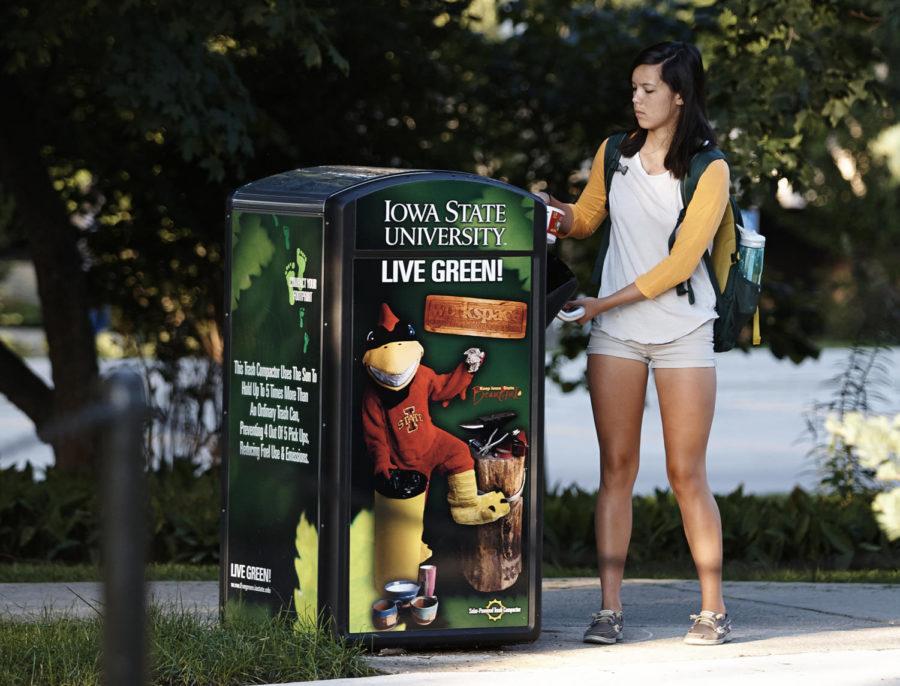ISU achieves the Princeton Review’s Green Honor Roll
A student throws her coffee cup into one of several solar powered trash compactors surrounding Central Campus.
September 3, 2014
Iowa State is among 24 colleges appearing on the Princeton Review’s 2015 Green Rating Honor Roll for receiving the highest possible green rating. The Princeton Review rated schools from a low of 60 points to a perfect score of 99.
A school receiving the highest green rating demonstrates commitment to sustainability in academics, campus infrastructure, activities and career development. Iowa State offers an interdisciplinary sustainability minor and more than 800 green courses.
Although Iowa State has previously been listed on the Princeton Review’s Green Colleges Guide, this year marks the first time being recognized on the honor roll list.
“We provide both educational and leadership experience for students that come to ISU to develop those skills that will be effective in their future career field,” said Merry Rankin, director of sustainability.
Iowa State strives to apply sustainability in multiple ways. All new construction and major renovations on campus promise to achieve the certification of gold LEED standards. Leadership in Energy and Environmental Design certification is awarded by the U.S. Green Building Council. The gold LEED certification is the second-highest standard possible.
The university also derives 10 percent of its energy by wind and reduces 50 percent of food waste by not using trays in dining halls. Campus waste is managed by the 42 solar compactors that replace trash containers throughout Iowa State’s campus.
“I wasn’t aware of Iowa State’s green rating, but knowing that now I’m glad I can say I attend a school that is accredited for something like that,” said Blake Archer, sophomore in pre-architecture. “It’s not something I would specifically look for in a school but I think it’s awesome and a good thing to keep in mind.”
Aside from recycling and using alternative resources, students and faculty play a big role in sustainability through community service involvement and leadership. Many campus programs and groups encourage individuals to apply green initiatives. The Tall Grass Prairie Project — directed by John Miranowski, professor of economics, and Cinzia Cervato, Morrill professor of geological and atmospheric studies — is a faculty group that focuses on integrating sustainability into every college at Iowa State.
“We’re trying to bring sustainability into all kinds of curriculum,” Miranowski said. “We have engineering, business, design, agriculture [and liberal arts and sciences] all in this workshop working together as a group and learning from each other.”
The Green Umbrella, a student organization on campus, strives to bring different student sustainability organizations together. The goal is to spread awareness about the sustainable efforts surrounding ISU students by combining their voices into one. Students can openly discuss issues and brainstorm green initiatives.
“I really respect the students for getting involved,” Miranowski said. “They’ve actually started a lot of the committees around here and getting the students involved in sustainability has the biggest impact because it’s something they will carry forward into their living style.”
Iowa State’s Live Green! Initiative, starting in 2008, challenged students, faculty and staff to be become a leader in sustainability among land-grant institutions and recognize the importance of ISU community involvement in order to reach this goal.
“It’s really exciting for us to be on this list and among schools like Harvard,” Rankin said. “We received the honor roll rating because everyone is making a difference; being a green college is important because the impact we make on our planet is going to impact generations that follow us.”

















